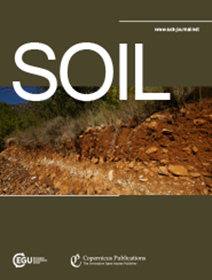Assessing Long-Term Effects of Tea (Camellia sinensis) Cultivation on Soil Quality in Highland Agroecosystems: A Case Study in Lam Dong, Vietnam
IF 5.8
2区 农林科学
Q1 SOIL SCIENCE
引用次数: 0
Abstract
Abstract. Long-term monoculture systems such as tea (Camellia sinensis) plantations can lead to significant changes in soil quality, directly influencing crop productivity and sustainability. This study investigates the impacts of tea cultivation over a 20-year period on key soil quality indicators in Lam Dong province, Vietnam—a major highland tea-growing region. Soils were sampled from plantations of varying ages (5, 10, and 20 years) and compared with native forest soils. Chemical, physical, and biological properties were assessed, including soil organic carbon (SOC), nutrient availability (N, P, K, S), pH, bulk density, plant-available water capacity (PAWC), aggregate stability, and earthworm populations. Results show a significant decline in SOC, available P and K, and PAWC with increasing plantation age, while bulk density and mechanical resistance increased, indicating progressive soil compaction. A multiple regression analysis revealed that SOC, available P, total K, and PAWC were the most predictive indicators of long-term tea productivity. Economic analysis suggests that tea cultivation remains marginally profitable after 20 years, provided that adequate fertilization is maintained. This study proposes critical threshold levels for soil quality indicators to support sustainable tea production in tropical highland systems.高原农业生态系统中茶(Camellia sinensis)种植对土壤质量的长期影响评估——以越南林东地区为例
摘要。长期的单一栽培系统,如茶树(Camellia sinensis)种植园,可导致土壤质量发生重大变化,直接影响作物生产力和可持续性。本研究调查了越南林东省一个主要的高原茶叶种植区20年期间茶叶种植对主要土壤质量指标的影响。从不同年龄(5年、10年和20年)的人工林中取样土壤,并与原始森林土壤进行比较。评估了土壤的化学、物理和生物特性,包括土壤有机碳(SOC)、养分有效性(N、P、K、S)、pH、容重、植物有效水量(PAWC)、团聚体稳定性和蚯蚓种群。结果表明:随着人工林年龄的增加,土壤有机碳、速效磷、速效钾和PAWC均显著下降,容重和机械阻力增加,土壤压实程度逐渐加深;多元回归分析表明,土壤有机碳、速效磷、全钾和PAWC是茶叶长期生产力的预测指标。经济分析表明,如果保持足够的施肥,茶叶种植在20年后仍然有利可图。本研究提出了支持热带高原系统可持续茶叶生产的土壤质量指标的临界阈值水平。
本文章由计算机程序翻译,如有差异,请以英文原文为准。
求助全文
约1分钟内获得全文
求助全文
来源期刊

Soil
Agricultural and Biological Sciences-Soil Science
CiteScore
10.80
自引率
2.90%
发文量
44
审稿时长
30 weeks
期刊介绍:
SOIL is an international scientific journal dedicated to the publication and discussion of high-quality research in the field of soil system sciences.
SOIL is at the interface between the atmosphere, lithosphere, hydrosphere, and biosphere. SOIL publishes scientific research that contributes to understanding the soil system and its interaction with humans and the entire Earth system. The scope of the journal includes all topics that fall within the study of soil science as a discipline, with an emphasis on studies that integrate soil science with other sciences (hydrology, agronomy, socio-economics, health sciences, atmospheric sciences, etc.).
 求助内容:
求助内容: 应助结果提醒方式:
应助结果提醒方式:


